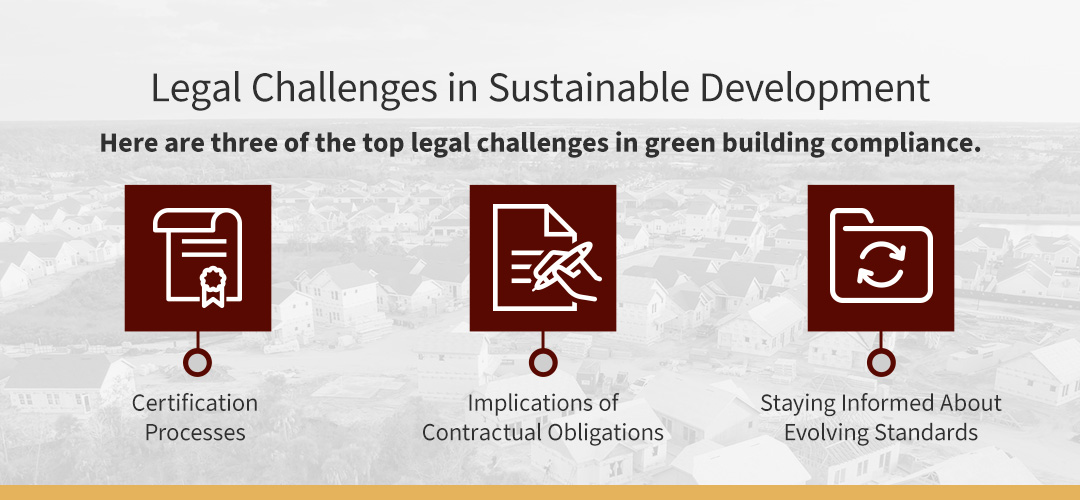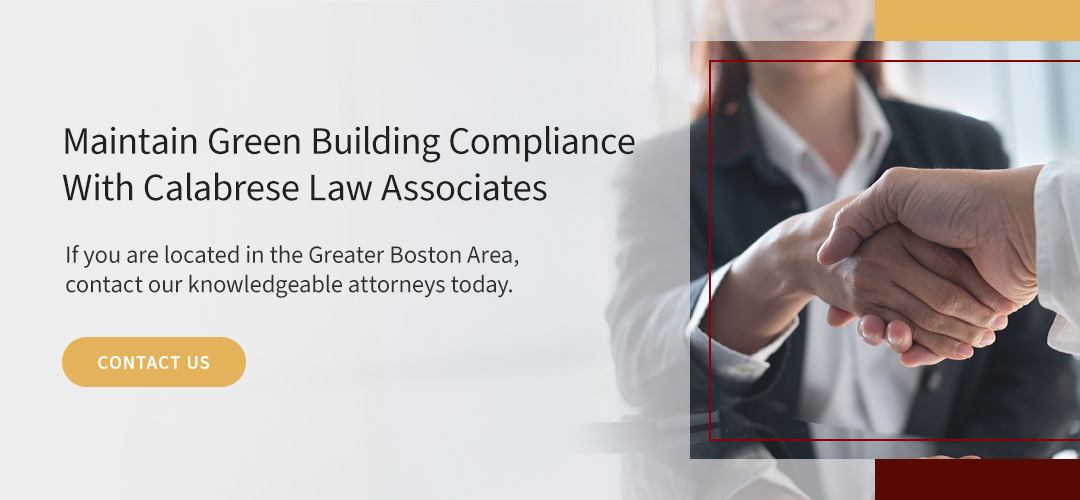Green building is when construction professionals consider environmental responsibilities, sustainability, and eco-friendliness at every stage of the construction process. Green building standards and practices offer various benefits, such as improved water conservation, energy efficiency, healthier indoor spaces, higher property values, and tax incentives.
Building professionals may reap the full benefits of these standards when they understand the regulations and how to navigate their challenges. This guide explores the various sustainable building regulations in Massachusetts, the legal challenges they pose for construction professionals, and best practices for overcoming these challenges.
What Are the Green Building Regulations?
Zoning laws and green building regulations are crucial to consider when working on new construction projects in Massachusetts. Zoning regulations and building codes are among the considerations for ensuring the type of building you develop is allowed within a particular area.
Here are a few other important sustainable building regulations and green building compliance opportunities.
LEED Certification
All state construction should meet the Massachusetts Leadership in Energy and Environmental Design (LEED) Plus Standard. The standard requires construction projects to have 20% better energy performance than the state’s building energy code. The Massachusetts LEED Plus Standard mandates that state buildings larger than 20,000 square feet should meet the 20% better energy performance requirement and achieve a LEED certification.
To check whether they meet the requirements, the design team simply needs to collect and send their data to the nonprofit U.S. Green Building Council (USGBC). The data is examined against a rating system with thresholds based on percentages.
The Stretch Code
According to the Green Communities Act of 2008, Massachusetts must update its building code every three years in accordance with the most recent International Energy Conservation Code (IECC) version. The state’s Stretch Code was introduced in 2009 and encourages more cost-effective, energy-efficient construction than that of buildings built to Massachusetts’s base building code.
The new Municipal Opt-in Specialized Energy Code, also called the Specialized Code, aims to ensure all new construction aligns with Massachusetts greenhouse gas limits and sub-limits.
Building Research Establishment Environmental Assessment Method (BREEAM) Accreditation
The Building Research Establishment (BRE) administers BREEAM accreditation, which is recognized internationally, after rating, assessing, and certifying a building’s environmental sustainability.
Green Globes Certification
The Green Building Initiative’s Green Globes is another green building rating system that can be applied to all types of commercial buildings. The assessment and certification system has rigorous sustainability criteria for construction, design, and operational practices to improve occupant wellness, building performance, and community benefit.
Financial and Legal Repercussions of Noncompliance
It’s important to understand the legal risks of noncompliance with the essential sustainable building regulations. Initiatives like the LEED Plus Standard and the Stretch Code are essential green building regulations that construction professionals in Massachusetts must comply with.
Noncompliance with these regulations may result in penalties, such as revocation of permits, fines, or other punitive measures that enforce compliance. For this reason, construction companies should aim to improve their transparency and accountability and continuously monitor their compliance so that compliance authorities can see that the building continues to meet sustainability standards.
Legal Challenges in Sustainable Development
Here are three of the top legal challenges in green building compliance.
1. Certification Processes
Being unable to achieve a desired certification can impact the owner or developer. For instance, these professionals might incorporate green building design features to achieve a specific certification level and leverage development or tax incentives. When the building does not meet those standards, the company may be unable to use the relevant incentives to help finance the project, resulting in adverse financial consequences.
Some companies may also miss these incentives when they do not achieve certification in a timely manner. This makes it important for building professionals to create a detailed scope of critical environmental features and schedule for implementing them on time.
2. Implications of Contractual Obligations
Another concern is that design professionals might find conditions in their contracts that are outside of their control. A contract could outline the extent of green building design elements and certifications the company wants to pursue for cost-benefit trade-offs. These requirements can cause challenges for design professionals because the contract may have unclear information about whether green building issues affect an architect’s customary standard of care.
When a contractual clause or warranty obligates design professionals to meet a heightened standard of care, they may be unsure if their errors and omissions insurance for architects will cover green building issues. This could also leave them subject to producing some results that are beyond their control. Construction professionals should work to clearly communicate expectations before drawing up a contract and outline who should take responsibility for these obligations.
3. Staying Informed About Evolving Standards
Green building standards and technology solutions are always evolving, making it crucial for construction companies to stay up to date with the latest information. Being unaware can cause complications when professionals realize they have not met the necessary requirements to attain certification.
This misinformation makes them unable to leverage the desired incentives and increase building costs. It may also influence additional costs to correct issues. For this reason, construction field experts should look into reliable sources of information, such as the latest news publications, industry journals, legal professionals, and conferences.
Best Practices for Navigating Legal Challenges
To reduce your chances of running into the above challenges with your construction project, consider these tips and best practices:
- Understand the requirements of energy efficiency initiatives: The Leading by Example (LBE) program is a Massachusetts initiative that promotes clean energy and sustainable practices to reduce the environmental impacts of state government operations. To ensure you create contractual obligations that reduce energy usage correctly, understand the various initiatives correctly by reviewing LBE initiative resources.
- Energy code training: Your professionals can avoid missing key standards by receiving training on the base building energy code, Specialized Code, and Stretch Code. The Mass Save energy efficiency program works with the Department of Energy Resources (DOER) and the Board of Building Regulation and Standards (BBRS) to sponsor this training. It is available to building professionals and building officials at various locations around the state. While building officials can receive training for free, other building professionals pay a nominal fee.
- Consulting a construction law attorney: To ensure more careful planning and attention to detail with the latest construction laws in mind, it helps to work with an experienced construction attorney. These professionals have in-depth knowledge of the latest construction laws and may inform you about changes to certification standards.
Why Trust Calabrese Law Associates
Calabrese Law Associates is a law firm with attorneys who specialize in Massachusetts construction law. We assist with a wide range of legal issues in the construction industry to help numerous professionals, such as architects, developers, engineers, construction managers, property owners, and more. Here are the key benefits of working with Calabrese Law Associates:
- Updates about evolving standards and construction laws: Our construction law attorneys stay up to date with the latest laws and regulations to keep clients informed when making construction and development choices.
- Wide range of construction law legal service areas: We help building professionals in numerous practice areas like zoning compliance, environmental law compliance, construction contracts, construction litigation, and commercial construction regulations.
- Industry-leading legal representation: Our legal team includes knowledgeable construction law attorneys with years of experience in efficiently and effectively advising clients on the best ways to proceed according to their specific circumstances.
If you need assistance understanding green building laws and regulations, contact our construction law attorneys for more information.
Maintain Green Building Compliance With Calabrese Law Associates
Understanding green building regulations and how to navigate common challenges is an important first step in meeting green building compliance. Take your strategy one step further by speaking with a construction law attorney at Calabrese Law Associates. We can help you stay aware of your obligations, develop an efficient legal strategy, and maintain green building compliance.
If you are located in the Greater Boston Area, contact our knowledgeable attorneys today.
This publication and its contents are not to be construed as legal advice nor a recommendation to you as to how to proceed. Please consult with a local licensed attorney directly before taking any action that could have legal consequences. This publication and its content do not create an attorney-client relationship and are being provided for general informational purposes only.
Attorney Advertising. Prior results do not guarantee a similar outcome.




